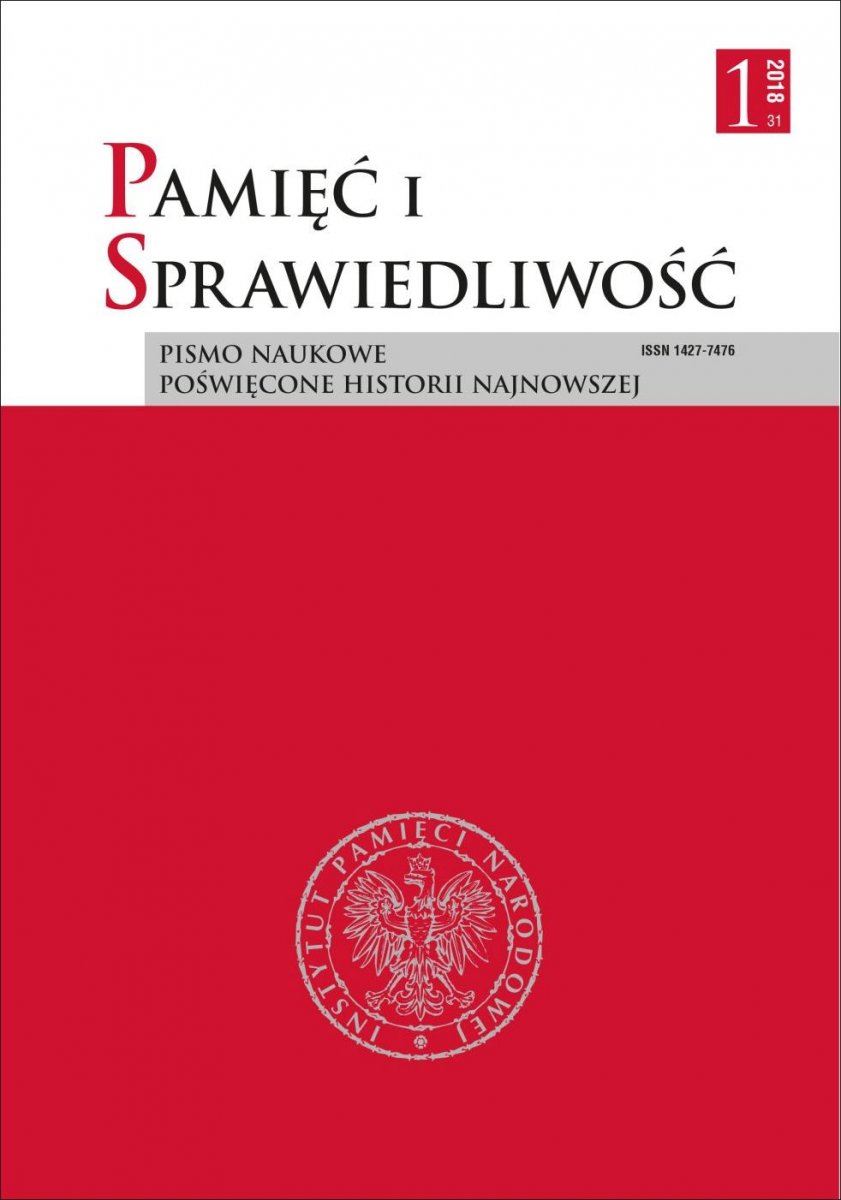Prasa szwajcarska o Polakach w dobie I wojny światowej
Pamięć i Sprawiedliwość, Vol. 31 No 1 (2018), pages: 122-137
Publication date: 2018-06-30
Résumé
Références
Pajewski J., Wokół sprawy polskiej. Paryż–Lozanna–Londyn, Poznań 1970.
Florkowska-Frančić H., Między Lozanną, Fryburgiem i Vevey. Z dziejów polskich organizacji w Szwajcarii w latach 1914–1917, Kraków 1997.
Bednarz P., Uwarunkowania obecności kwestii polskiej w prasie szwajcarskiej 1914–1918, „Dzieje Najnowsze” 2008, R. 40, nr 2.
Florkowska-Frančić H., Od akcji propagandowej do dyplomatycznej: Zabiegi o uznanie przez Szwajcarię państwa polskiego w latach 1918–1919 [w:] Polska i Polacy w XIX–XX wieku: studia ofiarowane Profesorowi Mariuszowi Kulczykowskiemu w 70. rocznicę Jego urodzin, red. K. Ślusarek, Kraków 2002.
Bednarz P., Dylematy neutralnych. Szwajcarska opinia publiczna wobec kwestii polskiej 1914–1918, Lublin 2012.
Bednarz P., Szwajcarscy korespondenci wojenni w Królestwie Polskim 1914–1915 [w:] Ważna obecność. Przedstawiciele państw i narodów europejskich wśród mieszkańców międzyrzecza Bugu i Pilicy w XVII–XIX w., red. A. Górak, K. Latawiec, Radzyń Podlaski – Radom 2006.
Płygawko D., Sienkiewicz w Szwajcarii: z dziejów akcji ratunkowej dla Polski w czasie pierwszej wojny światowej, Poznań 1986; eadem, Henryk Sienkiewicz jako prezes Generalnego Komitetu Pomocy Ofiarom Wojny w Polsce [w:] Henryk Sienkiewicz. Twórczość i recepcja, red. L. Ludorowski, Lublin 1991.
Złotkiewicz-Kłebukowska J., Polonofilska działalność Laurence Almy Tademy w czasie I wojny światowej, „Annales UMCS”, Sectio F, 1999/2000, vol. 54/55.
Rime J., Journet Ch., Un prêtre intellectuel dans la Suisse romande de l’entre-deux-guerre, Fribourg 2005.
Płygawko D., Benedykt XV dla Polski: 90-lecie papieskiej kolekty 21 listopada 1915, Poznań 2005.
Śladkowski W., Opcje polityczne Henryka Sienkiewicza w latach 1914–1916, Lublin 1991.
Krzyżanowski J., Sienkiewicza żywot i sprawy, Warszawa 1968.
Bednarz P., Akt 5 listopada ze szwajcarskiej perspektywy [w:] Akt 5 listopada 1916 roku i jego konsekwencje dla Polski i Europy, red. J. Kłaczkow, K. Kania, Z. Girzyński, Toruń 2016.
Bednarz P., Edmond Privat i jego działalność na rzecz Polski w czasie pierwszej wojny światowej, Lublin 2003.
Dunin-Wąsowicz K., Warszawa w pierwszej wojnie światowej, Warszawa 1974.
Dunin-Wąsowicz K., Warszawa 1914–1918, Warszawa 1989.
Eckert M., Historia Polski 1914–1939, Warszawa 1990.
Florkowska-Frančić H., L’Influence des Polonais sur l’opinion publique en Suisse pendant la première guerre mondiale [w:] Asyl und Aufenthalt. Die Schweiz als Zuflucht und Wirkungsstätte von Slaven im 19. und 20. Jahrhundert, red. M. Bankowski et al., Basel 1994.
 Język Polski
Język Polski
 English
English
 Deutsch
Deutsch
 Français (France)
Français (France)
 Italiano
Italiano
 Русский
Русский


 PDF (Język Polski)
PDF (Język Polski)
